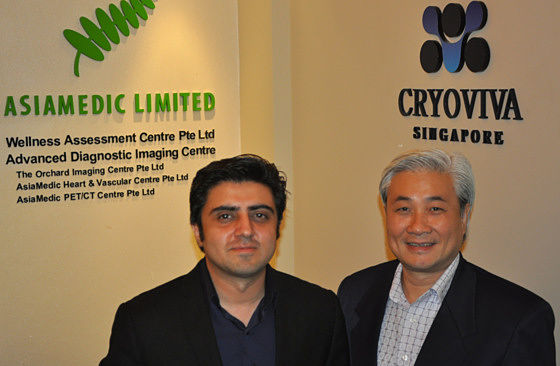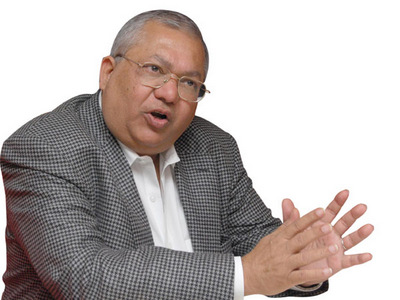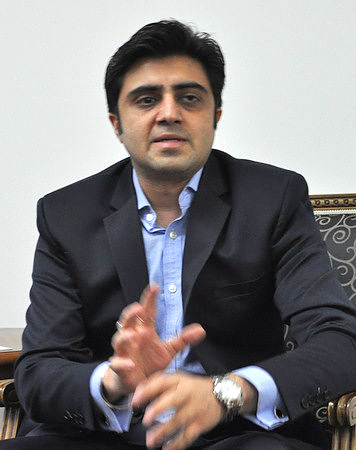 Dr Ashish Munjal (left) is the Chief Operating Officer of Cryoviva Singapore, a JV between AsiaMedic (CEO is Dr Wong Weng Hong, right) and Cryoviva International. Photo by Sim Kih
Dr Ashish Munjal (left) is the Chief Operating Officer of Cryoviva Singapore, a JV between AsiaMedic (CEO is Dr Wong Weng Hong, right) and Cryoviva International. Photo by Sim KihWhat's happening?
THE NEW YEAR has ushered in a new service provider for cord-blood banking in Singapore -- the fourth after listed company Cordlife, private company StemCord and public provider Singapore Cord Blood Bank.
Cryoviva Singapore, the newest entrant in this burgeoning business, has recently received the necessary licence for its facility, Cryoviva (Singapore) Laboratory Services, from the Ministry of Health in Singapore.
Cryoviva is a 75-25 joint venture between Cryoviva International and AsiaMedic Limited.
Cryoviva International's promoters have established similar businesses in India and Thailand which have emerged as the No.2 and a leading player, respectively, within just a couple of years.
 Ravi Jaipuria, chairman of RJ Corp, the largest PepsiCo bottler in India. Photo: www.ekantipur.comWho the partners are
Ravi Jaipuria, chairman of RJ Corp, the largest PepsiCo bottler in India. Photo: www.ekantipur.comWho the partners areCryoviva International is 70%-owned by Mr Ravi Jaipuria, Chairman of India-based RJ Corp, a conglomerate with businesses in real estate, hospitality, food & beverage, healthcare and education.
The remaining 30% is held by Dr T Chandroo, Chairman of Modern Montessori International Group, a Singapore company which specialises in early childhood education in the Asia-Pacific region.
Singapore-based and listed AsiaMedic is a new player in cord-blood banking but it offers local business insights to its partner -- in addition to housing the operations of Cryoviva Singapore on its premises in Shaw House in Orchard Road.
AsiaMedic's participation in the JV is one of the key moves the company has made since Dr Wong Weng Hong came on board as its CEO in March 2012.
Back then, it had two core businesses -- radiology and health screening -- and these were Singapore-centric. Now, AsiaMedic also owns majority stakes in Complete Healthcare International (a GP practice targeted at expats) and Astique The Aesthetic Clinic (an aesthetic business).
It also has created a mini-medical hub in Shaw House by leasing the entire 8th and 10th floors and sub-leasing space to several sub-tenants, some of whom require the advanced imaging services of AsiaMedic. AsiaMedic is also in the early stages of building a business for its services in China, Myanmar and Indonesia.
(See: ASIAMEDIC: From just 2 revenue streams to many, including cord-blood bank business)
What's the Singapore market's potential?
Singapore reported 42,663 births in 2012, up 7.4% from a year earlier.
The compound annual growth rate for private cord blood banking is projected to grow faster, at 9%, from 2011 to 2015, according to Deloitte & Touche Financial Advisory Services.
As it is, Singapore has a relatively high penetration rate of private cord blood banking at approximately 19% in 2011.
Deloitte expects this figure to rise to 25% by 2015, mainly driven by effective marketing activities by the service providers and increasing public awareness and acceptance levels.
Cryoviva Singapore is also eyeing business beyond Singapore's shores.
Dr Ashish Munjal, its Chief Operating Officer, said: “Singapore is an excellent place as a springboard for Cryoviva Singapore to expand into the region. We will be coming up with new initiatives to grow the business and forge ahead with expansion plans in the neighbouring ASEAN countries where urban populations are becoming increasingly better educated and wealthier."
What's cord blood banking?
Blood stem cell transplants offer a potential hope of cure for a number of life-threatening cancers, auto immune disorders and blood diseases. Cord blood is currently being used to treat malignant diseases such as leukaemia, lymphoma and numerous other types of cancer. |
 Dr Ashish Munjal has several years of experience in the cord blood banking business, having served as General Manager of RJ Corp's healthcare division (Cryobanks International India). Photo by Leong Chan TeikWhat differentiates Cryoviva Singapore?
Dr Ashish Munjal has several years of experience in the cord blood banking business, having served as General Manager of RJ Corp's healthcare division (Cryobanks International India). Photo by Leong Chan TeikWhat differentiates Cryoviva Singapore?While Cordlife and StemCord carry out their processing and storage activities (and own facilities in Singapore), Cryoviva Singapore prefers to contract Singapore Cord Blood Bank (SCBB) to do so.
Located in KK Women & Children's Hospital in Bt Timah Road, SCBB describes itself as a "national resource that is supported by Singapore's public healthcare clusters."
Explaining Cryoviva Singapore's choice, Dr Munjal described the protocols practised by SCBB as being "very stringent," adding that "the quality standards we wanted to offer to the market are fulfilled by SCBB."
With a new service provider, cordblood banking looks set to become better understood by parents-to-be in Singapore.
See AsiaMedic's press release on the appointment of Singapore Cord Blood Bank here.







